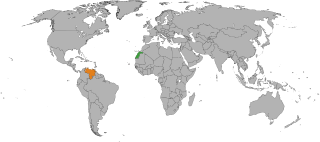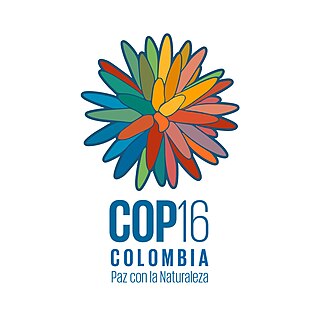
The Convention on Biological Diversity (CBD), known informally as the Biodiversity Convention, is a multilateral treaty. The Convention has three main goals: the conservation of biological diversity ; the sustainable use of its components; and the fair and equitable sharing of benefits arising from genetic resources. Its objective is to develop national strategies for the conservation and sustainable use of biological diversity, and it is often seen as the key document regarding sustainable development.
The United Nations Framework Convention on Climate Change (UNFCCC) is the UN process for negotiating an agreement to limit dangerous climate change. Formally it is an international treaty among countries to combat "dangerous human interference with the climate system", in part by stabilizing greenhouse gas concentrations in the atmosphere. It was signed in 1992 by 154 states at the United Nations Conference on Environment and Development (UNCED), informally known as the Earth Summit, held in Rio de Janeiro. The treaty entered into force on 21 March 1994. "UNFCCC" is also the name of the Secretariat charged with supporting the operation of the convention, with offices on the UN Campus in Bonn, Germany.
The United Nations Convention to Combat Desertification in Those Countries Experiencing Serious Drought and/or Desertification, Particularly in Africa (UNCCD) is a Convention to combat desertification and mitigate the effects of drought through national action programs that incorporate long-term strategies supported by international cooperation and partnership arrangements.

The World Customs Organization (WCO) is an intergovernmental organization headquartered in Brussels, Belgium. The WCO works on customs-related matters including the development of international conventions, instruments, and tools on topics such as commodity classification, valuation, rules of origin, collection of customs revenue, supply chain security, international trade facilitation, customs enforcement activities, combating counterfeiting in support of intellectual property rights (IPR), illegal drug enforcement, combating counterfeiting of medicinal drugs, illegal weapons trading, integrity promotion, and delivering sustainable capacity building to assist with customs reforms and modernization. The WCO maintains the international Harmonized System (HS) goods nomenclature, and administers the technical aspects of the World Trade Organization (WTO) Agreements on Customs Valuation and Rules of Origin.

The United Nations Conference on Environment and Development (UNCED), also known as the RioConference or the Earth Summit, was a major United Nations conference held in Rio de Janeiro from 3 to 14 June 1992.

The World Health Organization Framework Convention on Tobacco Control is a treaty adopted by the 56th World Health Assembly held in Geneva, Switzerland on 21 May 2003. It became the first World Health Organization treaty adopted under article 19 of the WHO constitution. The treaty came into force on 27 February 2005. It had been signed by 168 countries and is legally binding in 182 ratifying countries. There are currently 14 United Nations member states that are non-parties to the treaty.

Green Cross International is an environmentalist organisation headquartered in Geneva, Switzerland, founded by former Soviet leader Mikhail Gorbachev in 1993. Today, member organisations are in 30 countries. Its primary mission is to "respond to the combined challenges of security, poverty, and environmental degradation to ensure a sustainable and secure future".
Withdrawal from the United Nations by member states is not provided for in the United Nations Charter.

Atheist Alliance International (AAI) is a non-profit advocacy organization committed to raising awareness and educating the public about atheism. It does this by supporting atheist and freethought organizations around the world through promoting local campaigns, raising awareness of related issues, sponsoring secular education projects and facilitating interaction among secular groups and individuals.

The Convention on the Rights of Persons with Disabilities is an international human rights treaty of the United Nations intended to protect the rights and dignity of persons with disabilities. Parties to the convention are required to promote, protect, and ensure the full enjoyment of human rights by persons with disabilities and ensure that persons with disabilities enjoy full equality under the law. The Convention serves as a major catalyst in the global disability rights movement enabling a shift from viewing persons with disabilities as objects of charity, medical treatment and social protection towards viewing them as full and equal members of society, with human rights. The convention was the first U.N. human rights treaty of the twenty-first century.

In the European Union (EU), enhanced cooperation is a procedure where a minimum of nine EU member states are allowed to establish advanced integration or cooperation in an area within EU structures but without the other members being involved. As of October 2017, this procedure is being used in the fields of the Schengen acquis, divorce law, patents, property regimes of international couples, and European Public Prosecutor and is approved for the field of a financial transaction tax.

Karen Christiana Figueres Olsen is a Costa Rican diplomat who has led national, international and multilateral policy negotiations. She was appointed Executive Secretary of the UN Framework Convention on Climate Change (UNFCCC) in July 2010, six months after the failed COP15 in Copenhagen. During the next six years she worked to rebuild the global climate change negotiating process, leading to the 2015 Paris Agreement, widely recognized as a historic achievement.

Relations between the European Union and the Republic of India are currently defined by the 1994 EU–India Cooperation Agreement. The EU is a significant trade partner for India and the two sides have been attempting to negotiate a free trade deal since 2007. Indo-EU bilateral trade stood at US$104.3 billion in the financial year 2018–19.
A world taxation system or global tax is a hypothetical system for the collection of taxes by a central international revenue service. The idea has garnered currency as a means of eliminating tax avoidance and tax competition; it has also aroused the ire of nationalists as an infringement upon national sovereignty.

Sahrawi Republic–Venezuela relations refers to the current and historical relations between the Sahrawi Arab Democratic Republic (SADR) and Venezuela.

The United Nations Climate Change Conferences are yearly conferences held in the framework of the United Nations Framework Convention on Climate Change (UNFCCC). They serve as the formal meeting of the UNFCCC parties – the Conference of the Parties (COP) – to assess progress in dealing with climate change, and beginning in the mid-1990s, to negotiate the Kyoto Protocol to establish legally binding obligations for developed countries to reduce their greenhouse gas emissions. Starting in 2005 the conferences have also served as the "Conference of the Parties Serving as the Meeting of Parties to the Kyoto Protocol" (CMP); also parties to the convention that are not parties to the protocol can participate in protocol-related meetings as observers. From 2011 to 2015 the meetings were used to negotiate the Paris Agreement as part of the Durban platform, which created a general path towards climate action. Any final text of a COP must be agreed by consensus.

The Singapore Convention on Mediation, formally the United Nations Convention on International Settlement Agreements Resulting from Mediation is an international agreement which provides a uniform and efficient framework for the recognition and enforcement of mediated settlement agreements that resolve international, commercial disputes - akin to the framework that the 1958 New York Convention provides for arbitral awards. It was adopted on 20 December 2018 by the UN General Assembly and opened for signature on 7 August 2019. The Convention entered into force on 12 September 2020, that is, six months after the deposit of the third ratification instrument by Qatar, the first two being Singapore and Fiji.

The global minimum corporate tax rate, or simply the global minimum tax, is a minimum rate of tax on corporate income internationally agreed upon and accepted by individual jurisdictions in the OECD/G20 Inclusive Framework. Each country would be eligible for a share of revenue generated by the tax. The aim is to reduce tax competition between countries and discourage multinational corporations (MNC) from profit shifting that avoids taxes.

The Kunming-Montreal Global Biodiversity Framework (GBF) is an outcome of the 2022 United Nations Biodiversity Conference. Its tentative title had been the "Post-2020 Global Biodiversity Framework". The GBF was adopted by the 15th Conference of Parties (COP15) to the Convention on Biological Diversity (CBD) on 19 December 2022. It has been promoted as a "Paris Agreement for Nature". It is one of a handful of agreements under the auspices of the CBD, and it is the most significant to date. It has been hailed as a "huge, historic moment" and a "major win for our planet and for all of humanity."

The 2024 United Nations Biodiversity Conference (COP16) of the Parties to the UN Convention on Biological Diversity (CBD) is scheduled to be held from October 21 to November 1, 2024 in Cali, Colombia. The monitoring framework agreed at the previous conference should allow the progress of the countries towards national goals and targets under the Kunming-Montreal Global Biodiversity Framework to be evaluated.
















